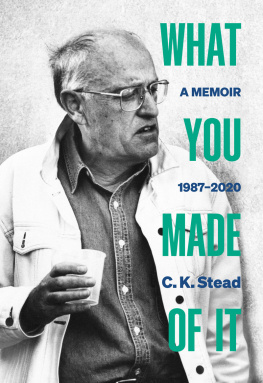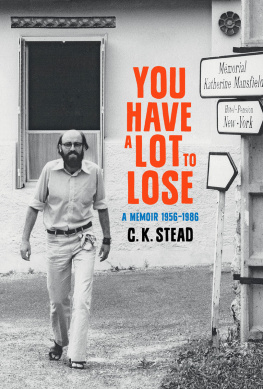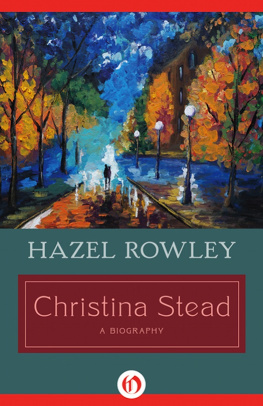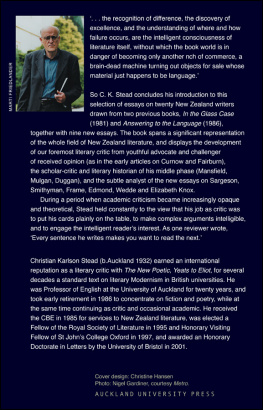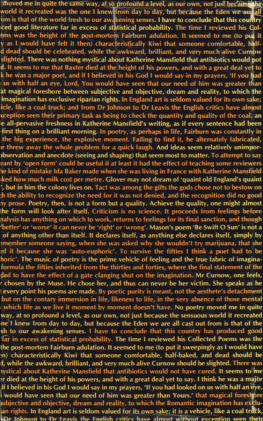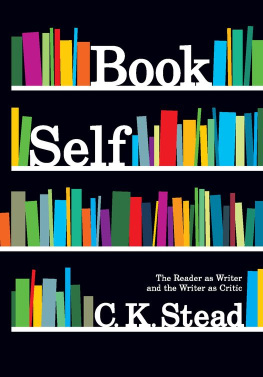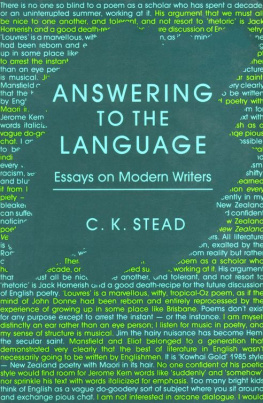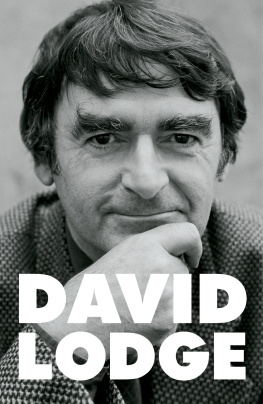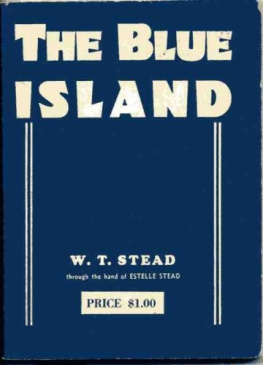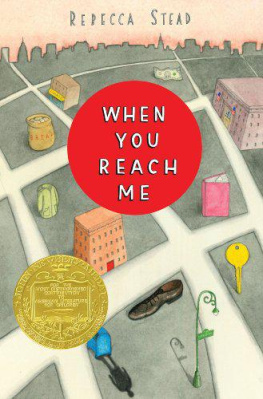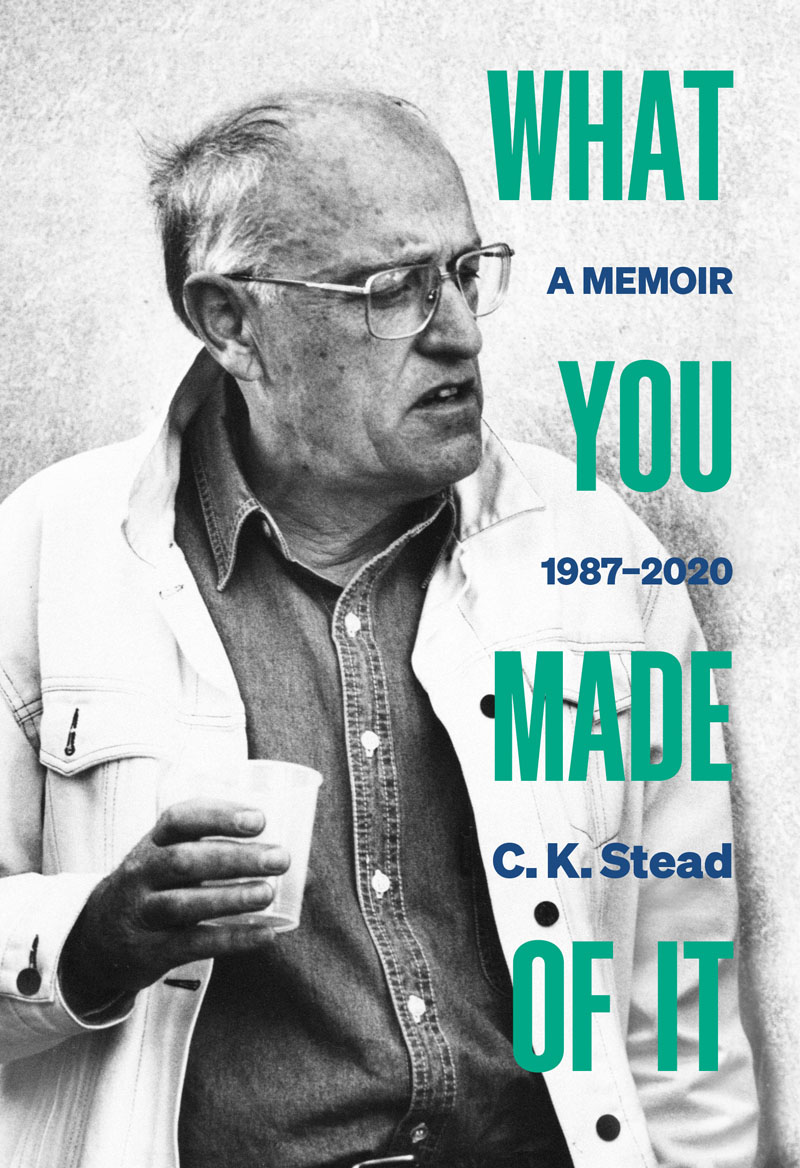

To Kay Oliver, Charlotte and Margaret and to whnau (including my sister Frances) and friends everywhere
AROHANUI
The world as you found it Catullus
was neither
benign nor malign
but what you made of it.
Also by C. K. Stead
Poetry
Whether the Will is Free
Crossing the Bar
Quesada
Walking Westward
Geographies
Poems of a Decade
Paris
Between
Voices
Straw into Gold
The Right Thing
Dog
The Red Tram
The Black River
Collected Poems, 19512006
The Yellow Buoy: Poems 20072012
In the Mirror, and Dancing
That Derrida Whom I Derided Died
Fiction
Smiths Dream
Five for the Symbol (stories)
All Visitors Ashore
The Death of the Body
Sister Hollywood
The End of the Century at the End of the World
The Singing Whakapapa
Villa Vittoria
The Blind Blonde with Candles in her Hair (stories)
Talking about ODwyer
The Secret History of Modernism
Mansfield
My Name Was Judas
Risk
The Name on the Door is Not Mine (stories)
The Necessary Angel
Memoir
South-West of Eden: A Memoir 19321956
You Have a Lot to Lose: A Memoir 19561986
Criticism
The New Poetic
In the Glass Case
Pound, Yeats, Eliot and the Modernist Movement
Answering to the Language
The Writer at Work
Kin of Place: Essays on 20 New Zealand Writers
Book Self: The Reader as Writer and the Writer as Critic
Shelf Life: Reviews, Replies and Reminiscences
Edited
Oxford New Zealand Short Stories (second series)
Measure for Measure, a Casebook
Letters and Journals of Katherine Mansfield
Collected Stories of Maurice Duggan
Faber Book of Contemporary South Pacific Stories
Werner Formans New Zealand
First published 2021
Auckland University Press
University of Auckland
Private Bag 92019
Auckland 1142
New Zealand
www.aucklanduniversitypress.co.nz
C. K. Stead, 2021
ebook ISBN 9781776710720
Published with the assistance of Creative New Zealand

A catalogue record for this book is available from the National Library of New Zealand
This book is copyright. Apart from fair dealing for the purpose of private study, research, criticism or review, as permitted under the Copyright Act, no part may be reproduced by any process without prior permission of the publisher. The moral rights of the author have been asserted.
Book design by Carolyn Lewis
Cover design by Spencer Levine
Cover images: Front Courtesy of the Gerrard and Marti Friedlander Charitable Trust Back Copyright NZ Herald/Brett Phibbs
Contents
By Way of Introduction
Rounding off You Have a Lot to Lose, and believing I would not live to write an account of the years that followed my departure from the university in 1986, I wrote that, despite my endless perambulations between New Zealand and the out there world, I still thought of myself as a loyal Pkeh New Zealander with deep and abiding attachments to Tmaki Makaurau. In todays very generous Radio NZ review of that book Harry Ricketts described it as memoir rather than an autobiography autobiography, he suggested, being about oneself, memoir about oneself and other people. Somewhere in Le Rouge et le Noir Stendhal says a novel is like a mirror walking along a road. These which now become three memoirs are that kind of writing not fiction, but the report of one who consistently reflects, looking out rather than in and reporting what he sees. These are my encounters and engagements with the world of books and writers, and of teaching and writing about them. I am not interesting except insofar as I meet, engage with, and report upon, interesting people, places and events. The world reflected in my ambulant mirror is primarily literary, but behind it constantly is the broader image of politics and society.
What You Made of It completes the more than thirty years of my literary life after I left the shelter of the university to be a full-time writer; but the narrative this time is only roughly chronological, broken into chapters each of which centres on a scene or theme, and on related places and persons. As with the previous two I claim that this is as truthful to memory and to the written or printed record as I can make it; but it is not (and could not be) comprehensive. Some people who have been important in my life are absent, sometimes for reasons of privacy, discretion, accident, or simply for the convenience or the imperatives of narrative. Three of these oversights are given an Appendix but there could be many more. Even my family are mostly background to a literary life but to treat them otherwise always threatened to expand the memoir beyond reasonable limits.
Every book creates its own rules as it goes, and the writer, while acknowledging his part, indeed his responsibility for every word, is aware of a kind of helplessness, and will say, if only to himself, this is the best I could do, being the person I am and given the chances life and the gene pool threw my way. In these scary midwinter/Matariki nights, when coronary symptoms remind me of my dire prognosis, I think of the benign words of the bronze statue of the writer in Dubravkin Put at the end of my story Last Seasons Man: Old friend, you must know theres no Justice. That I am here and Tomislav is not is neither right nor wrong. The Universe is indifferent and does not love us. Everything is Chance.
C. K. S.
Tmaki Makaurau
23 June 2020
1.
Oxford and Consequences
Dan Davin and etc.
I begin with Dan Davin and Oxford, not because the man or the location is more important than other persons or places that will figure in this book, but because they are a focal point for stories: there are lines out from the man and the place, interconnections with what is to follow. Dan was a writer, and Oxford a notable academic hub. My ambition had been to be a writer, full-time; and the academic world was the one I hoped to escape from, though without entirely turning my back on it. So to begin with Dans death will serve as a symbolic stepping-off point for the story of Stead, recently retired from his professorship at the University of Auckland and now well launched on his new freelance literary life.
In my copy of Dans book of memories of literary friends, Closing Times, there is a clipping of his death notice in The Times saying the funeral will be at 11.30 at the Oxford Crematorium, Headington, 1 October (1990). I have scribbled on it the train I would take, Paddington 9.50 10.40. I was in London and had just a day or so before farewelled Kay at Gatwick on a plane back to New Zealand, so would go to the funeral alone.
I remember Bruce Purchase as Master of Ceremonies. Bruce was a New Zealand actor we had got to know in London during my 1965 sabbatical leave, because his wife at that time, Elspeth Sandys (later to be Maurice Shadbolts penultimate), had been a student of mine. Bruce had been attached to my old friend of student years, Susan Davis; and we had seen him on the stage at the Old Vic. His contribution to the occasion was notable not just because he brought an actors voice and skill to his delivery but because his friendship with the Davins, both Dan and Winnie, in Dans last days and weeks, had been close. Bruce was the son of a soldier who had served in the NZ Div. in World War II, like Dan had been wounded and decorated, and had survived the war but not for as many years as Dan. These were facts which were of enormous importance to Dan and gave Bruce a special place.
Next page
